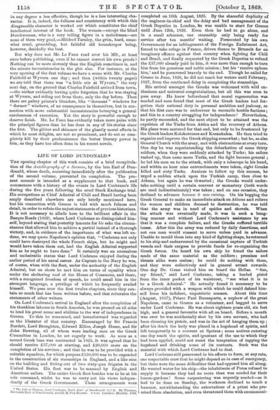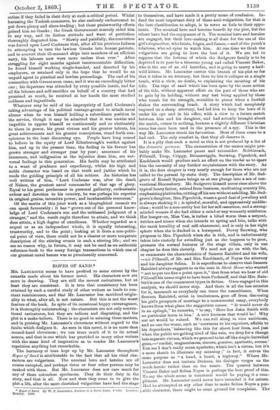LIFE OF LORD DUNDONALD.*
Tun opening chapter of this work consists of a brief recapitula- tion of the Autobiography of a Seaman, by the late Earl of Dun- donald, whose death, occurring immediately after the publication of the second volume, prevented its completion. The pre- sent memoir is intended as a supplement to that book, and commences with a history of the events in Lord Cochrane's life during the five years following the cruel Stock Exchange trial. His occupations as Chief Admiral of Chili and Brazil having been amply described elsewhere are only briefly mentioned here, but his connection with Greece is told with much fulness and detail, in order to refute the unjust statements of previous historians. It is not necessary to allude here to the brilliant affair in the Basque Roads (1809), where Lord Cochrane so distinguished him- self, beyond stating that posterity laments for his sake the circum- stances that allowed him to achieve a partial instead of a thorough victory, and, in evidence of the importance of what was left un- done, we may quote Napoleon's opinion that, "Cochrane not only could have destroyed the whole French ships, but he might and would have taken them out, had the English Admiral supported him as he ought to have done." It certainly was an anomalous and undesirable status that Lord Cochrane enjoyed during the earlier period of his naval career. As Captain in the Navy he was, of course, when with the fleet, under the authority of the English Admiral, but on shore he met him on terms of equality when under the sheltering roof of the House of Commons, and there, with a recognized freedom of speech, he could assail him in the strongest language, a privilege of which he frequently availed himself. We pass over the first twelve chapters, since they con- tain so much that has been written before, and that reiterates the statements of other writers.
On Lord Cochrane's arrival in England after the completion of his thankless labours in South America, he was pressed on all sides to lend his great name and abilities to the war of independence in Greece. To this he consented, and henceforward was regarded as the liberator of that country. Encouraged by Sir Francis Burdett, Lord Broughton, Edward Ellice, Joseph Hume, and Sir John Bowring, all of whom were leading men on the Greek Committee in London, he set eagerly to work. As soon as a second Greek loan was contracted in 1825, it was agreed that he should receive /37,000 at starting, and /.20,000 more on the completion of his services ; and that he was to be provided with a suitable squadron, for which purpose £150,000 was to be expended in the construction of six steamships in England, and a like sum on the building and fitting-out of two sixty-gun frigates in the United States. His fleet was to be manned by English and American sailors. The entire Greek fleet besides was to be at his sole command, whilst he was to carry out his views indepen- dently of the Greek Government. These arrangements were • The Life of Thomas, Lord Cochrane, Tenth Earl of Dundonald, O.C.B. By Thomas, Eleventh Earl of Dundonald, and H. B. Fox Bourne. 2 vols. London: Bentley. 1869.
completed on 16th August, 1825. By the shameful duplicity of the engineer-in-chief and the delay and bad management of the Greek Deputies in London, Ire was unable to start for Greece until June 12th, 1826. Even then he had to go alone, and in a small schooner, one steamship only being ready for service after ten months' waiting. Persecuted by his own Government for an infringement of the Foreign Enlistment Act, forced to take refuge in France, driven thence to Brussels for an imaginary offence against that country when fighting for Chili and Brazil, and finally requested by the Greek Deputies to refund the /37,000 already paid to him, it was more than enough to turn him from his generous and noble mission ;but his resolve upbore him,' and he persevered bravely to the end. Though he sailed for Greece in June, 1826, he did not reach her waters until February, 1827, from the continued delay in completing the steamships.
His arrival amongst the Greeks was welcomed with wild en- thusiasm and universal congratulations, but all this was soon to pass away. He knew beforehand that moral regeneration was needed and soon found that most of the Greek leaders had for- gotten their national duty in personal ambition and jealousy, so that his first care was to endeavour to reconcile hostile factions ; and this in a country straggling for independence I Nevertheless, he partly succeeded, and the next object to be attained was the expulsion of the Turks from Attica and the recovery of Athens. His plans were matured for that end, but only to be frustrated by the Greek leaders Kolokotrones and Karaiskakes. He then tried to organize and improve the Greek shipping somewhat ; but he, as also General Church with the army, met with obstructions at every turn. One day he was superintending the debarkation of some thirty soldiers, when they were suddenly attacked by Turks ; his sailors rushed up, then came more Turks, and the fight became general ; he led his men on to the attack, with only a telescope in his hand, and within an hour nine entrenchments were taken, eight Greeks killed and sixty Turks. Anxious to follow up this success, he urged a sudden attack upon the Turkish camp, then close to Athens, but again he was thwarted ; the Greeks would under- take nothing until a certain convent or monastery (both words are used indiscriminately) was taken ; and on one occasion, they declined to advance because it was raining. On his begging the Greek General to make an immediate attack on Athens and relieve the women and children doomed to destruction, he was told that the army was in need of spitides and shovels. When the attack was eventually made, it was in such a bung- ling manner and without Lord Cochrane's assistance by sea that it was a complete failure, and the Greeks suffered terrible losses. After this the army was reduced by daily desertions, and not one man would consent to serve unless paid in advance. Unable to mould them into any kind of fighting shape, he returned to his ship and endeavoured by the occasional capture of Turkish vessels and their cargoes to provide funds for re-organizing the Greek forces. On board his own ship he found the sailors made of the same material as the soldiers ; promises and threats alike were useless ; he could do nothing with them, and they were collectively and in general arrant cowards. One day Dr. Gosse visited him on board the Hellas. "See, my friend," said Lord Cochrane, taking a loaded pistol from the inner pocket of his waistcoat, "see what it is to be a Greek Admiral." He actually found it necessary to be always provided with a weapon with which he could defend him- self from his indolent, unpatriotic seamen. About this time (August, 1827), Prince Paul Buonaparte, a nephew of the great Napoleon, came to Greece as a volunteer, and begged to serve under Lord Cochrane. He was about eighteen years old, six feet high, and a general favourite with all on board. Before a month was over be was accidentally shot by his own servant, who had been cleaning his pistols, and was in the act of hanging them up ; after his death the body was placed in a hogshead of spirits, and left temporarily in a convent at Spetzas ; some natives entering one day smelt the spirits, and ignorant of the use to which they had been applied, could not resist the temptation of tapping the hogshead and drinking some of its contents. Such was the material with which Lord Cochrane had to deal.
Lord Cochrane still persevered in his efforts to form, at any rate, one respectable crew that he might depend on in case of emergency, but there were the same difficulties that had opposed him all along. He wanted water for his ship—the inhabitants of Pomo refused to supply it because they had no more than was needed for their lemon-gardens ! Some carpentering was urgently needed—as it had to be done on Sunday, the workmen declined to touch a hammer, notwithstanding the exhortations of a priest who pro- mised them absolution, and even threatened them with excommuni- cation if they failed in their duty at such a critical period. Whilst harassing the Turkish commerce, he also zealously endeavoured to put down piracy and slave-taacling ; but these praiseworthy efforts gained him no thanks ; the Greek Government scarcely aided him in any way, and its listless attitude and want of patriotism thoroughly disgusted him. "Slowly and painfully, the conviction was forced upon Lord Cochrane that, after all his previous failures in attempting to turn the lawless Greeks into honest patriots, and to convert their ill-manned ships into members of an efficient navy, his labours now were more useless than ever." After struggling for eight months against insurmountable difficulties, he found himself working single-handed, and deserted by his employers, or retained only in the hope that he would be an unpaid agent in piratical and lawless proceedings. The end of his connection with Greece soon came, and it was an exceedingly bitter one; his departure was attended by every possible insult, and for all his labours and self-sacrifice on behalf of a country that had promised so much, he received at her hands the most studied coldness and ingratitude.
Whatever may be said of the impropriety of Lord Cochrane's taking advantage of his political vantage-ground to attack naval abuses when he was himself holding a subordinate position in the service, though it may be admitted that it was unwise and impolitic to oppose himself so continuously and so obstinately to those in power, his great virtues and his greater talents, his great achievements and his greater conceptions, stand forth con- spicuous to the least discerning eye. People have long ceased to believe in the equity of Lord Ellenborough's verdict against him, and up to the present time, the feeling in his favour has grown stronger and stronger year by year; assurance of his innocence, and indignation at the injustice done him, are uni- versal feelings in this generation. His faults may be attributed to a want of prudence and expediency, whilst his high and noble character was based on that truth and justice which he made the guiding principle of all his actions. An historian has well written of him, "Lord Cocluane was, after the death of Nelson, the greatest naval commander of that age of glory. Equal to his great predecessor in personal gallantry, enthusiastic ardour and devotion to his country, he was perhaps his superior in original genius, inventive power, and inexhaustible resources."
Of the merits of this joint work as a biographical memoir we can speak favourably; it has "grown out of the personal know- ledge of Lord Cochrane's son and the unbiassed judgment of a stranger," and the result ought therefore to attain, and we think does attain, a high degree of excellence. Whether regarded as a sequel or as an independent whole, it is equally interesting, trustworthy, and to the point ; looking at it from a non-politi- cal point of view, there could not be a clearer or more temperate description of the stirring events in such a stirring life; and we see no reason why, in future, it may not be used as an authentic reference-book to the many foreign transactions in which one of our greatest naval heroes was so prominently concerned.































 Previous page
Previous page